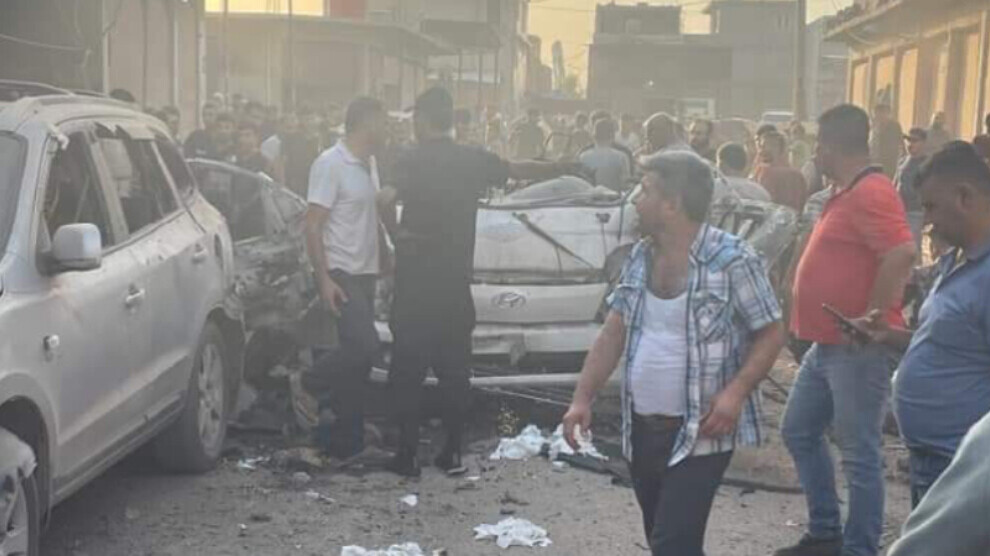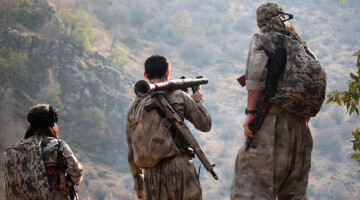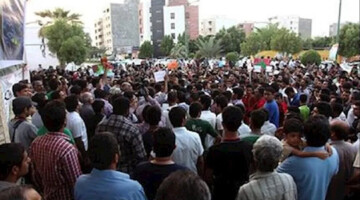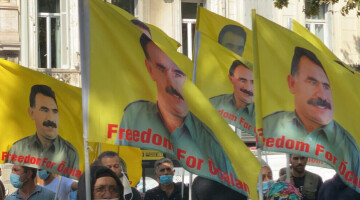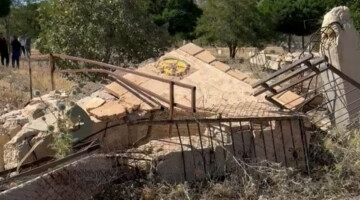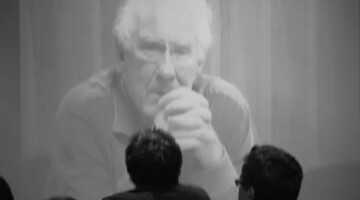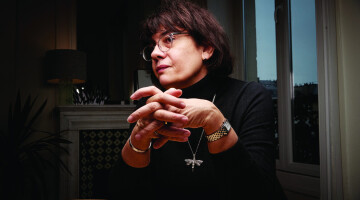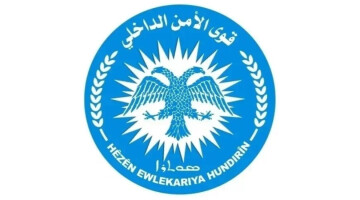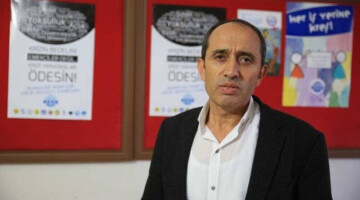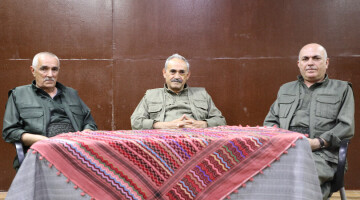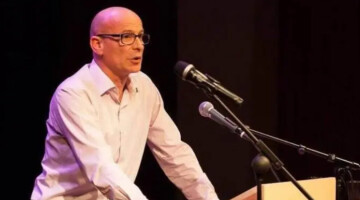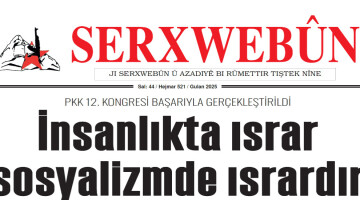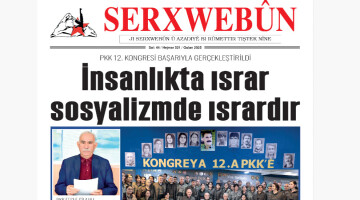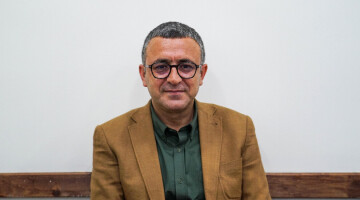On 30 October 2014, the fascist AKP/MHP government and the war institution called the National Security Council met in Ankara to make their "Decomposition Plan" against the Kurdish people. Meaning "to bring to the knees", the "decomposition plan", which was produced during the dialogue process with Abdullah Öcalan, is the prelude to a new cycle of chaos and massacres against Kurds, which has now surpassed the dark 1990s many times over.
Between 2013 and 2015, there were talks between the PKK and the Turkish state aimed at working out a democratic solution to the Kurdish question. On 24 July 2015, the phase of dialogue between the Turkish state and the Kurdish liberation movement was officially declared over with the bombing of Qandil in southern Kurdistan (northern Iraq) by the Turkish air force. With the unilateral termination of the peace process, a total war of extermination against the Kurdish people began, which cost the lives of countless people.
This concept of war continues to this day - albeit in different forms. When ISIS attacked Kobanê in northern Syria, the government in Ankara pursued a double policy. While on the one hand, talks were held with the officials of the Rojava Revolution, on the other hand, the Turkish government supplied ISIS with logistics and weapons, opened its borders to the jihadists and encouraged massacres of the Kurds. After the Kurds had inflicted a historic defeat on the terror in Kobanê, the Turkish state finally intervened directly.
The first storm in the chaos cycle: Revenge attack in Qereçox
Disturbed by the successful advance of the Rojava Defence Forces against ISIS, the Turkish state carried out its first revenge attack in the midst of the Syrian Democratic Forces' (SDF) liberation offensive in Tabqa. The target was Mount Qereçox near Dêrik, located in the Syria-Iraq-Turkey tri-border area, thus connecting Rojava, Bashur and Bakur, the west, south and north of Kurdistan. At the time, the massif housed the headquarters of the People's and Women's Defence Units (YPG/YPJ) and other facilities of the two combat units. In the morning hours of 25 April 2017, more than two dozen fighter jets of the Turkish Air Force entered Syrian airspace controlled by the international coalition against ISIS and bombed Qereçox. Fourteen female fighters and six male fighters were killed, eighteen others were injured, some seriously. Among the victims were three members of the YPG and YPJ press centre.
Wars of aggression against Afrin and Serêkaniyê
In order to prevent the Kurds from gradually, step by step, approaching an international status, Ankara then relied on the "operations" phase. When the YPG and YPJ launched a major strike against ISIS in Deir ez-Zor in eastern Syria, Turkey's first threats were made against the Afrin region. It was not long before the Erdoğan-led country opened a new theatre of war on 20 January 2018 with massive air strikes and the entry of Turkish troops, bombing Afrin from the ground and from the air under the cynical name "Operation Olive Branch". After 58 days of Turkish bombing terror, the Kurdish-majority canton was occupied.
With the crushing of ISIS’ territorial rule by capturing the last jihadist stronghold of Baghouz in spring 2019, the Turkish government escalated its military violence against the Kurds in Syria. The current foreign minister and then head of the Turkish domestic intelligence service MIT, Hakan Fidan, who had already constructed a pretext for armed intervention in Syria on several occasions, as evidenced, among other things, by a tape recording leaked in 2014, once again created a reason for war against the defence forces of Rojava, who had captured the hearts of people all over the world with their resistance. Under the pretext of "securing the border", the government in Ankara launched another invasion in northern and eastern Syria on 9 October 2019, this time named "Operation Peace Spring". The focus of the occupation was the towns of Serêkaniyê (Ras al-Ain) and Girê Spî (Tal Abyad).
Demographic change and de-Kurdification
The AKP and MHP regimes seek the borders of the Misak-ı Milli [the Ottoman National Pact]. Areas within the borders of the Ottoman National Pact are to be reincorporated into the territory of the Republic of Turkey. This is the main goal of the decomposition plan drawn up in 2014. In the course of the wars of aggression against Rojava, many people were killed, injured, displaced. Instead of around one million women, men and children forcibly displaced from the occupied territories under Erdoğan's dirigisme, jihadists and their families from countries such as Turkmenistan and Kyrgyzstan have been settled. The Turkish state is pursuing a policy of ethnic cleansing in Rojava and is implementing a long-planned project of de-Kurdification by changing the demographic structure. The Kurdish language was pushed out of public life in the occupied zone, street and place names were exchanged for Turkish or Arabic. The lira was introduced as currency and the administration was transferred to Turkish governors. Turkish is a compulsory subject at schools.
Embargo and siege
Another flashpoint in the autonomous region of northern and eastern Syria is the policy of embargo and siege to wear down the population of around five million people. The Til Koçer (Al-Yarubiyah) border crossing with Iraq, through which humanitarian aid reached the autonomous region, was closed in 2018 by decision of the UN Security Council at Russia's insistence. In 2020, the closure was reconfirmed. As a result, UN aid deliveries from Iraq are no longer possible and the Syrian regime is blocking aid deliveries via Damascus. The inner-Kurdish border crossing Sêmalka between Bashur and Rojava is not subject to a permanent closure. The KDP (Kurdistan Democratic Party), which dominates the government of the Kurdistan Region of Iraq and cooperates with the MIT, nevertheless closes the border time and again. The same picture presents itself at the gates of Damascus. The Syrian regime systematically prevents the delivery of food, medicine and necessities, which are particularly vital for the people in the canton of Shehba and in the neighbourhoods of Şêxmeqsud (Sheikh Maqsoud) and Eşrefiyê (Ashrafiyah) in Aleppo.
Syria has been at war for over twelve years, the economy has collapsed, there are international sanctions. The embargo and siege policy to stifle Rojava's revolution is part of Turkey's decomposition plan against the Kurdish movement.

